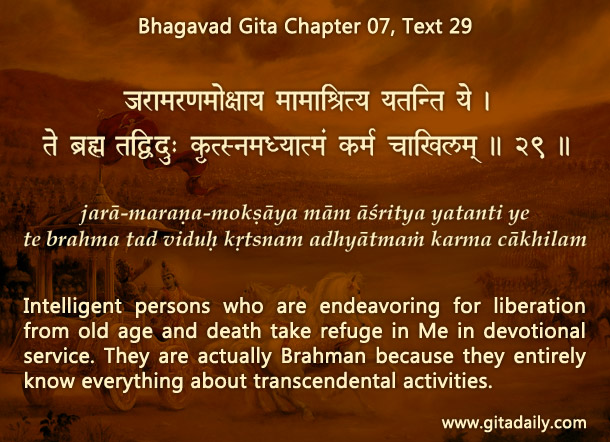When giving a class, good teachers want to know how well their students are hearing and understanding. To that end, they sometimes include in their class some points that students are unlikely to understand. Students who question those points demonstrate their attentiveness.
Krishna as the teacher par excellence uses a similar strategy in the Bhagavad-gita. Toward the end of the seventh chapter, he mentions several terms whose imports are quite complex: terms such as brahma, adhyatma and karma in 07.29; and adhibhuta, adhidaiva, adhiyajna and prayana-kala in 7.30. Even if Arjuna had heard those terms earlier and had a generic sense of their meaning, it’s highly unlikely that he would know the specific sense in which Krishna was using those terms.
Being an attentive student, Arjuna immediately asks about those terms in the next two verses. Arjuna’s eagerness to learn is also seen by his remembering and repeating all those terms — and that too in the same sequence in which Krishna spoke them. Arjuna asks about brahma, adhyatma, karma, adhibhuta and adhidaiva in 08.01; and about adhiyajna and prayana-kala in 08.02. Thus, Arjuna passes Krishna’s test with flying colors.
That the mention of these terms was for testing Arjuna is also reinforced by the terseness of Krishna’s answers. He explains the first six terms in just two verses, giving sutra-like definitions that require further elaboration. Several Gita commentators have expounded on those terms, drawing from the Upanishads where they are used more often. Krishna elaborates on the seventh term, prayana-kala, because that elaboration helps him pursue the purpose of his narrative: to contrast the potency of the processes of dhyana-yoga (discussed in chapter six) and bhakti-yoga (discussed in chapter seven).
One-sentence summary:
The Krishna-Arjuna exchange at the transition from chapter seven to eight demonstrates a good teacher-student exchange: during a class, when a vigilant teacher intentionally mentions unfamiliar terms, a diligent student immediately inquires about them.
Think it over:
- While speaking the Gita, why does Krishna suddenly mention several unfamiliar terms?
- How is Arjuna’s caliber as a student seen in the Gita’s eighth chapter?
- Why does Krishna elaborate on six terms briefly and the seventh term in greater detail?
***
07.29: Persons who have acted piously in previous lives and in this life and whose sinful actions are completely eradicated are freed from the dualities of delusion, and they engage themselves in My service with determination.
To know more about this verse, please click on the image


Leave A Comment